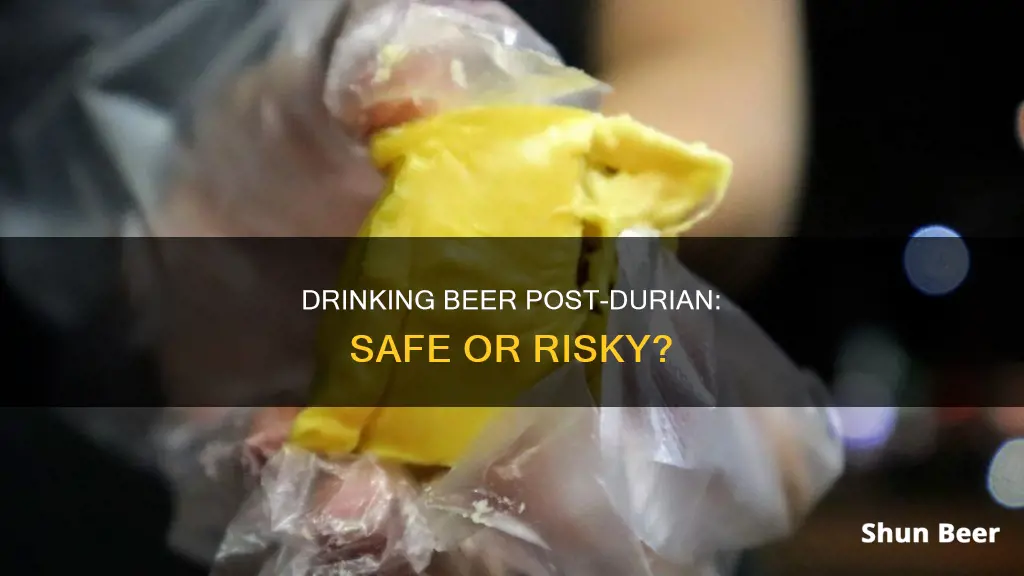
There is a common belief that consuming durian and alcohol together can be harmful, and even fatal. This belief is based on the idea that durian's high sulphur content can affect the body's ability to process alcohol, potentially leading to severe side effects such as facial flushing, nausea, and migraines. While there is some scientific evidence to support this theory, it is not conclusive, and the combination is generally considered to be safe for most people. However, it is important to note that excessive intake of durian and alcohol together may cause heartburn and bloating, and for those with pre-existing medical conditions, the combination could be dangerous.
| Characteristics | Values |
|---|---|
| Effect on alcohol breakdown | Durian might decrease how quickly the body breaks down alcohol, leading to heightened symptoms of drunkenness such as severe headaches, nausea, and vomiting. |
| Cause of heightened symptoms | Durian contains high amounts of the sulfur-based compound diethyl sulfide, which can inhibit the effect of the enzyme Aldehyde dehydrogenase by 70%. |
| Fatality | There is no conclusive scientific evidence that eating durian and drinking alcohol together is fatal. However, there have been documented cases of people with pre-existing conditions dying shortly after this combination. |
| Recommended | It is not recommended to eat durian while drinking alcohol to prevent unwanted side effects. |
What You'll Learn

Durian's sulphur content and alcohol metabolism
Durian is a well-known tropical fruit in Southeast Asia, recognised for its pungent odour. This distinct smell is due to the fruit's high concentration of volatile sulphur compounds (VSCs), particularly thiols and disulfides. When durian is consumed alongside alcohol, it can negatively impact the body's ability to process alcohol.
The liver typically metabolises alcohol in two stages. Firstly, the enzyme alcohol dehydrogenase converts ethanol to acetaldehyde, a toxic substance. Secondly, the enzyme aldehyde dehydrogenase converts acetaldehyde into less harmful substances, such as carbon dioxide and fatty acids. However, when durian is consumed with alcohol, the metabolic activity of aldehyde dehydrogenase is significantly reduced, by up to 70%. This impairment is caused by durian's high sulphur content, specifically the sulphur-based compound diethyl sulfide, which inhibits the effect of aldehyde dehydrogenase.
As a result of this inhibition, the breakdown of alcohol is delayed, and acetaldehyde is free to travel through the bloodstream to various parts of the body. This can lead to heightened symptoms of alcohol intoxication, including severe headaches, nausea, and vomiting, as well as heart palpitations, facial flushing, and low blood pressure. These adverse effects are not limited to the aforementioned; acetaldehyde has been identified as a cancer-causing substance during in vivo testing.
While there is no scientific evidence that the combination of durian and alcohol is fatal, the unwanted side effects on the body are evident, and the severity of these effects will depend on the amount of alcohol consumed. People with pre-existing conditions, such as diabetes, heart problems, and hypertension, are particularly vulnerable and should refrain from consuming durian with alcohol.
Does Helium-Infused Beer Really Work?
You may want to see also

The urban myth of fatal consequences
Durian is a tropical tree found in Southeast Asia. Its fruit has a spiky outer covering and a pungent smell. The flesh of the fruit is creamy and has a devoted fanbase. However, the fruit is also surrounded by many myths, one of which is that drinking alcohol after eating durian can be deadly. This belief is especially prevalent among older people, while millennials tend to regard it as a myth.
The origin of this myth can be traced to the high levels of sulphuric compounds found in durian. These compounds are believed to affect the body's ability to process alcohol. When alcohol is consumed, the liver releases an enzyme called alcohol dehydrogenase, which converts alcohol to acetaldehyde, a toxic substance. Another enzyme, aldehyde dehydrogenase, is then released to convert acetaldehyde into less harmful substances. However, studies have shown that when durian is consumed with alcohol, the metabolic activity of the aldehyde dehydrogenase enzyme is reduced by 70%. This impairment in the breakdown of alcohol can lead to heightened symptoms of intoxication, including severe headaches, nausea, and vomiting, heart palpitations, facial flushing, and low blood pressure.
While there is no conclusive scientific evidence that the combination of durian and alcohol is fatal, it is important to note that the sulphur content in durian can indeed affect alcohol breakdown in the body. Additionally, there have been documented cases of individuals with pre-existing health conditions such as diabetes, heart problems, and hypertension who died shortly after consuming durian and alcohol together.
To avoid potential adverse effects, it is recommended to refrain from consuming durian while drinking alcohol. While the myth of sudden death may not be entirely accurate, the combination of durian and alcohol can indeed lead to unwanted side effects and, depending on the amount of alcohol consumed, may even be fatal. Therefore, it is advisable to exercise caution and avoid mixing durian and alcohol, especially for individuals with pre-existing health conditions.
The Magic of Beer Fob: How It Works
You may want to see also

Heightened drunk symptoms
While there is no conclusive scientific evidence that eating durian and drinking alcohol is a deadly combination, it is still not recommended. This is because durian contains high levels of sulphur-based compounds, specifically diethyl sulfide, which can affect the body's ability to process alcohol.
When alcohol enters the body, it goes to the liver, where the enzyme alcohol dehydrogenase is released. This enzyme promotes the conversion of alcohol to acetaldehyde, a toxic substance. Another enzyme, aldehyde dehydrogenase, is then released to convert acetaldehyde to less harmful substances, such as carbon dioxide and fatty acids. However, when durian is consumed with alcohol, the metabolic activity of aldehyde dehydrogenase is reduced by up to 70%. This means that acetaldehyde, the toxic substance, is free to travel into the bloodstream and can be delivered to different parts of the body.
The presence of high levels of sulphur compounds in durian inhibits the activity of the aldehyde dehydrogenase enzyme, impairing and lengthening the breakdown of alcohol in the body. This can lead to heightened symptoms of drunkenness, including severe headaches, nausea, vomiting, heart palpitations, facial flushing, and low blood pressure. These symptoms are more pronounced than usual due to the delay in alcohol breakdown caused by the sulphur content in durian.
While the combination of durian and alcohol may not be immediately fatal, it can lead to unwanted side effects and, depending on the amount of alcohol consumed, may potentially have fatal consequences. Therefore, it is recommended to avoid consuming durian while drinking alcohol to prevent these unwanted side effects.
Drinking Beer While Driving in New Zealand: What's Allowed?
You may want to see also

Pre-existing conditions and durian with alcohol
While there is no conclusive scientific evidence that consuming durian and alcohol together is fatal, there are documented cases of people dying shortly after eating durian and drinking beer. However, these individuals had pre-existing conditions such as diabetes, heart problems, and hypertension.
Durian contains high levels of sulfur compounds, which can affect the body's ability to process alcohol. Specifically, durian inhibits the activity of the enzyme Aldehyde Dehydrogenase, which is responsible for breaking down the toxic substance Acetaldehyde formed during alcohol metabolism. As a result, consuming durian with alcohol can lead to heightened symptoms of intoxication, including severe headaches, nausea, vomiting, heart palpitations, facial flushing, and low blood pressure.
Therefore, if you have pre-existing conditions such as diabetes, heart problems, or hypertension, it is strongly advised that you avoid consuming durian with alcohol. The combination may lead to unwanted side effects and, in rare cases, even death. It is crucial to keep these facts in mind when drinking alcohol and avoid eating durian simultaneously, especially if you have any of the mentioned pre-existing conditions.
Additionally, according to Traditional Chinese Medicine (TCM), both durian and alcohol have "warming" properties. Excessive consumption of either can lead to a concept known as "heaty," which can cause symptoms such as a phlegmy cough, sore throat, constipation, and fever. Thus, moderate consumption is always advised, regardless of whether they are consumed together or separately.
Beer and Acetaminophen: A Safe Mix?
You may want to see also

TCM perspective on durian and alcohol
From a Traditional Chinese Medicine (TCM) perspective, durian is considered a "heaty" food with a strong "warming" property. According to TCM, durian has an abundance of male "yang" energy. For those with body constitutions that are predisposed to heatiness, overindulging in durians can lead to symptoms such as a phlegmy cough, sore throat, mouth ulcers, constipation, and fever.
Alcohol also has warming properties according to TCM. When consumed together, the aggressive warming of the body's systems can be harmful. The high levels of sulphuric compounds in durian can inhibit the liver's ability to break down alcohol, leading to higher levels of toxins in the body. This can result in heightened symptoms of intoxication, such as severe facial flushing, nausea, migraines, heart palpitations, and vomiting.
While there is no conclusive scientific evidence that consuming durian and alcohol together is fatal, it is generally advised to practice moderate consumption when it comes to both durian and alcohol, whether consumed together or separately.
Drinking Beer and Driving: What's the Legal Limit?
You may want to see also
Frequently asked questions
It is not recommended to drink beer or any alcohol after eating durian. Durian contains high levels of sulphur, which can affect how the body processes alcohol. This can lead to more severe symptoms of intoxication, such as headaches, nausea, and vomiting.
When alcohol is consumed, it enters the liver and an enzyme called Alcohol Dehydrogenase is released, which converts the alcohol to a toxic substance called Acetaldehyde. Another enzyme, Aldehyde Dehydrogenase, is then released to convert Acetaldehyde into less harmful substances. However, when durian is consumed with alcohol, the metabolic activity of Aldehyde Dehydrogenase is reduced by up to 70%, allowing the toxic Acetaldehyde to enter the bloodstream and causing more pronounced symptoms of intoxication.
While there is no conclusive scientific evidence that the combination is fatal, it can lead to unwanted side effects and, depending on the amount of alcohol consumed, may potentially be dangerous. There have been documented cases of people dying shortly after consuming durian and alcohol, but these individuals had pre-existing health conditions.
To avoid potential adverse effects, it is best to refrain from consuming durian while drinking alcohol. If you have pre-existing health conditions such as diabetes, heart problems, or hypertension, it is especially important to avoid this combination. Always consume in moderation and be mindful of your body's reactions.







